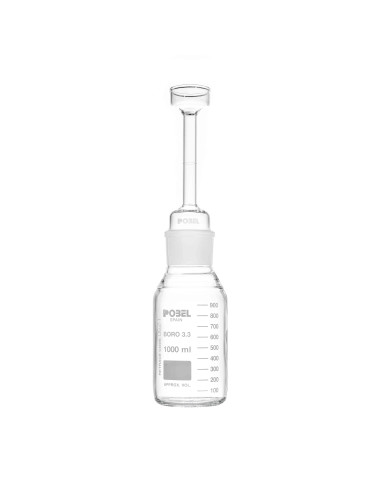PYCNOMETERS FOR SOLIDS
For density determination of bituminous materials and minerals. Made of 3.3 borosilicate glass and calibrated at 20 ºC.
| Ref. | Capacity (ML) | Joint | Buy |
|---|---|---|---|
| Ref.: 0100497510 | Capacity (ML): 500 | Joint: 45/40 | |
| Ref.: 0100497520 | Capacity (ML): 1000 | Joint: 60/46 | |
| Ref.: 0100497530 | Capacity (ML): 2000 | Joint: 60/46 | |
|
Total:
0,0
All prices with tax excluded.
|
|||
Pycnometers for Solids
Pycnometers for solids are essential instruments used in chemical and physical laboratories to determine the density of solid substances. With a precise design and high-quality materials, these tools provide reliable results when measuring the density of non-porous solids.
How do pycnometers for solids work?
Solid pycnometers operate based on the mass difference between the solid and the displaced liquid. By immersing the solid in the liquid inside the pycnometer, the displaced volume is measured, which is crucial for calculating the density of the sample.
Key Features of Solid Pycnometers
-
High precision: ideal for obtaining detailed and accurate measurements in laboratory settings.
-
Durability: made with chemical-resistant materials to ensure long-lasting performance.
-
Versatility: suitable for a variety of non-porous solids.
Why Choose a Pycnometer for Solids?
A pycnometer for solids is particularly valuable in areas such as research, material analysis, and quality control. Its ability to provide precise density measurements helps optimize production processes and product development in industries like pharmaceuticals, metallurgy, and chemistry.
Instructions for Using a Pycnometer for Solids
- Clean and dry the pycnometer thoroughly before use.
- Partially fill the pycnometer with a liquid of known density.
- Carefully place the solid sample into the pycnometer.
- Measure the volume of displaced liquid and calculate the density of the solid.
FAQs about Solid Pycnometers
1. What types of solids can be measured with a pycnometer for solids?
- These devices are suitable for measuring the density of non-porous solids that remain stable in contact with the pycnometer liquid.
2. Does temperature affect measurements with a pycnometer?
- Yes, temperature can influence the density of the liquid. It is recommended to perform measurements at a constant temperature to ensure consistent and accurate results.








